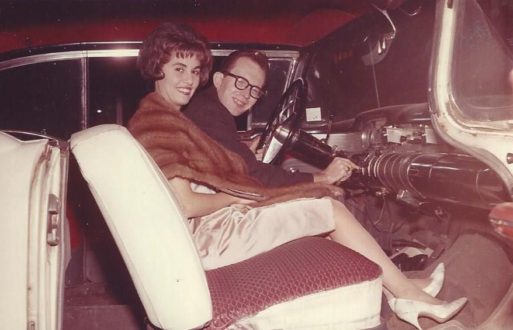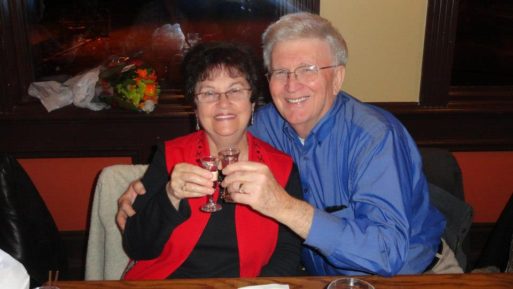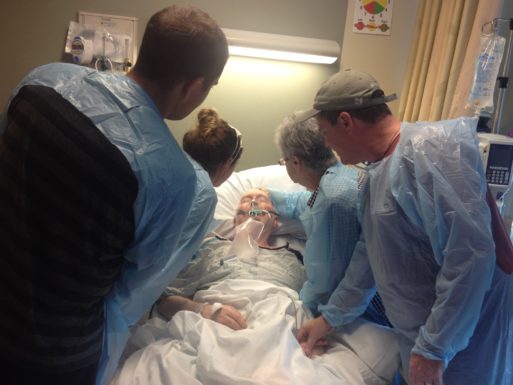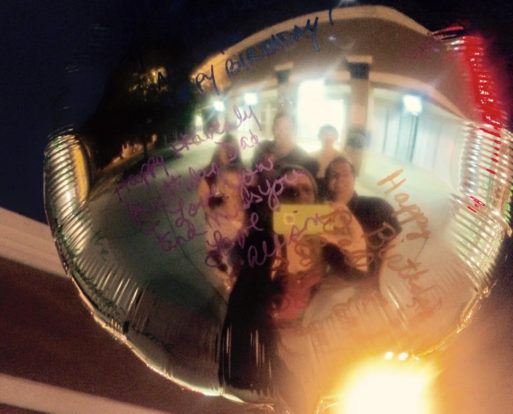
Arlene and Jack in their younger “courting” years.
This is Dana ‘s story as told by Irena Kaci. Our Opening Our Hearts stories are based on people’s real-life experiences. By sharing these experiences publicly, we hope to help our readers feel less alone in their grief and, ultimately, to aid them in their healing process. In this story, Dana tells the story of her father-in-law Jack’s last few years and his deathbed vigil.
I’ve always been very comfortable with end-of-life issues. Maybe it’s because I was so involved in my own father’s last days, or maybe it’s just in my nature. It’s hard to figure out. I took family medical leave to care for my father while he was in hospice for 10 months. After his death, I volunteered for hospice, visiting patients in their homes. Years later, I left television to attend massage school. I spent the next decade working as a massage therapist for hospice patients.
I’ve never balked at the idea that death is a natural conclusion to life and that being alive means dealing with that eventual inevitability. This is the story of my father-in- law’s passing. His name was John, but everyone called him Jack.
He was fiercely private about his suffering, and took a lot of space around it.
Jack was an old classic. He was stoic, reserved, and very much the old stereotype of a man’s man. Becoming terminally ill was something that –to him –must’ve seemed like a moral failing. He was fiercely private about his suffering, and took a lot of space around it. I was family, but at the same time, I was an in-law so I think it was easy for him to have a different relationship with me. I provided massage for him, and he shared things with me that he wouldn’t share with other family members. He wore a toupee and was very shy about it. He generally never let people see him without it. But because I had this additional role to him that was medicinal, he would take it off around me. He reminded me so much of my own father. My husband used to always ask me “How can you stand to be around him? He’s just a real life Archie Bunker!” And the truth of it was that he wasn’t wrong, but it didn’t bother me. I really liked him I found his antics funny and familiar.
My father-in-law was diagnosed with lung cancer a year or so before he died. But he had received an innovative treatment that placed little cleaning mechanisms inside his lungs, and he had actually gotten 100% better. It was eight months after the treatment that he once again began having issues. Of course, because he was battling it all on his own, he started behaving very erratically and would get very irritable. It was very hard for his wife and his family because they couldn’t understand what was wrong. We would have these family gatherings, and he would opt out or not seem interested.

Arlene and Jack on their 50th anniversary.
Finally in August of 2014, after being in and out of rehab, he needed to go to the hospital because he couldn’t breathe. At that time, the physician working with him pulled his wife and children aside and explained that my Jack’s lungs looked like “Swiss cheese,” and they needed to start thinking about hospice care. It was the first time anyone in the family had heard anything about the recurrence of lung cancer. When everyone was able to see the x-rays, it really made it clear how much we needed to mobilize for an end-of-life plan. Things looked really grim.
Everyone who he had ever loved and who had ever been his family was just gathered up
We arrived at the hospital and found him alert and responsive, even though he was being fed oxygen through a mask. It was this incredibly moving moment because in that small room there were so many people who had been the most important people in his life: his wife, his two children, and spouses, his four grandchildren, and his last living sibling. Everyone who he had ever loved and who had ever been his family was just gathered up there for this end-of-life moment. It was a cocoon of comfort. The priest finally came in to give him his last rites while we were all gathered in that room. I find so much comfort in that space, it was such a lovely last vigil, a special nest of love.
Everyone Jack had ever loved got to tell him how much they also loved him back and how much they would miss him. Having that connection at the end, well I just can’t imagine a more ideal way to go.
During all my years of working in hospice, we talk a lot about what’s known as “holding space.” It’s this concept that you make yourself present and make room for an emotion or experience. I apply this by using my energy to hold everyone so that they can feel safe to simply be and experience. I feel so lucky that I was able to observe from some distance, as a professional, while at the same time being personally impacted. After we held space for him, everyone began to disperse. My husband and I stayed behind, along with my mother- in-law and sister-in-law. By the evening he seemed to be stable, so even that small group left.

Jack on his deathbed, surrounded by his family.
The following day they informed us that he could no longer breathe on his own and they were forcing air into his lungs. The next step, we were told, would be intubation. “You’re going to have to make a decision,” the doctor said. “The next step is definitely intubation. We know you don’t want extreme measures, but if he is going to continue living, he needs to be intubated.”
He passed away with his wife, his son and his daughter in the room.
My mother-in-law made the decision. She decided to stop the breathing apparatus so that he could die in peace. He passed away with his wife, his son and his daughter in the room. I encouraged them to touch his upper body so he could feel their presence in his final moments. As he took his final breaths, I know he had a point of connection. I know that he could hear them and knew that they were close, and they loved him. The release that comes from that, that I think he felt, is so important to transitioning from life into what comes next. Jack was such a strong supporter of his family. Family meant the most to him, and having his most immediate family there was the most important thing. I really wish this for everyone, because the comfort and peace was palpable for all three of them when they said goodbye.
My mother-in-law commemorates his death every year. The first anniversary of it we spent with her, to recreate the moment. Jack loved going to Friendly’s for ice cream sundaes so that’s what we did. We went to Friendly’s in our town and got ice cream. We also bought some Mylar balloons and wrote messages to send to him. People really underestimate the catharsis of just sending something into the sky to reach loved ones. I loved being with the same group of people who said goodbye to him together and having this little ritual that could bring us together a bit more.

A Mylar balloon with all of our wishes/memories for Jack
(Mylar Balloon with all of our wishes/memories for Jack.)
Grief really is a predictable process in that it follows a certain arc.
My father-in-law was cremated, which surprised me. He was a devout Catholic, but it was his wish to be cremated. Since there was no body at the funeral, it was especially helpful that all of us had the physical experience of saying goodbye. Grief really is a predictable process in that it follows a certain arc. As a professional in the business, I really value the physical aspect of it. Without a body in a casket, it can be very hard to find closure.
Growing up was hard for my husband, and familial relationships are often fraught with unresolved issues. But I think that’s the magic of this experience. It helped him be present for and make peace with his past. Despite his failings, Jack clearly loved his family and his kids more than anything. And I think my husband finally really felt that.
I have been called to witness someone dying four different times in my career, and this was the most poignant instance of it. I am so grateful that I can keep doing this work and can keep helping families with the transition from life into death for loved ones. Being able to do that for someone was so meaningful, not just to me, but also to my spouse and his entire family. It was truly a blessing. It set the gold standard for an ideal end-of-life experience. I think death can be as beautiful and meaningful as birth if we can reframe the way we view the process and hold space for it. Jack, and his family really showed me that.

 My Father-In-Law Died Surrounded by Love
My Father-In-Law Died Surrounded by Love


 How Dare You Die Now!
How Dare You Die Now!
 Debating Medical Aid in Dying
Debating Medical Aid in Dying















